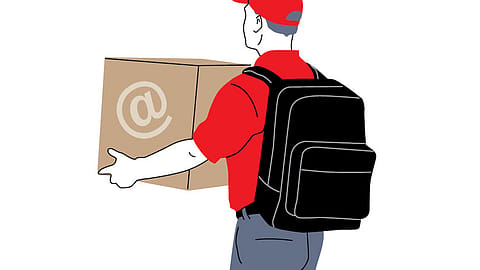Money in package deals
How cargo handlers are riding the e-commerce wave.

Online shopping is about so much more than just seeing a product on a shopping site and buying it. Getting the product to the customer is a vital part of keeping customers happy—and getting them to come back and buy more. Manish Chopra, CEO of shopping portal Zovi.com, says that in e-commerce, the product matters almost as much as the shopping experience. “Logistics, which is the only touch point with the customer, is hygiene. Without reliable and scaleable logistics, it’s difficult to repeat business.”
Courier services and general logistics companies are just not cut out to deal with the e-commerce boom; they have “traditionally carried documents and cargo, so are often not able to fulfil the needs of e-commerce”, says Sahil Baruah, CEO of Delhivery. His company is one of the several ‘e-commerce only’ logistics companies to have sprung up in the last few years.
One of the big asks of a courier service that delivers for an e-commerce company is to take care of cash-on-delivery orders. According to a May 2013 report by consultancy Ernst & Young, cash-on-delivery accounted for 50% to 80% of online retail sales. A logistics company used to delivering documents isn’t cut out to deal with payments and the like.
That’s why outsourcing to a specialist e-commerce delivery company makes sense. These companies, such as Delhivery, Chhotu.in, and Ecom Express, not only manage cash on delivery, they are also geared to pick up products that customers want to return to the shopping site.
Some large e-commerce players do set up their own logistics services, but an in-house company makes sense only when there’s an average of 100 deliveries a day in one city. With companies like Delhivery and Ecom Express, even a start-up can offer good logistics support. “Such companies don’t have to allocate resources for [logistics] and can devote themselves to the core job,” says Pragya Singh, associate director, retail, at consultancy Technopak.
It hasn’t been an easy job for the new e-commerce-only logistics companies. “Convincing e-commerce companies that we could achieve scale wasn’t easy because we were pitted against giants. But we succeeded. We are present in 54 cities and will be in 150 by March next year,” says Delhivery’s Baruah.
Sensing opportunity slipping from their grasp, traditional logistics companies have floated separate divisions to cash in on e-commerce delivery. “We realised that only a separate entity would be flexible and nimble enough to cater to this demand,” says Sanjiv Kathuria, CEO, DotZot, the e-commerce services arm of logistics company DTDC.
With companies such as Flipkart moving to the marketplace model, operations have become more complex. A logistics company may have to ship from 5,000 vendors across the country. As Baruah puts it: “Getting all these operators on a virtual platform will be a big challenge for Indian e-commerce.”